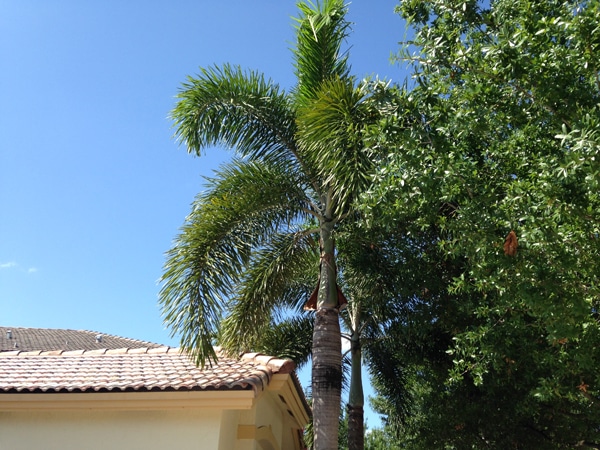A palm tree fertilizer is very different than lawn or shrub fertilizers, palm trees have very different nutritional needs than other landscape plants.South Florida palms are under severe stress, stress from insect pests like the new spiraling whitefly which literally suck the life out of them to our soil that plays a huge part in the health and vitality of palms, our soils are known as Calcareous soils.
Bellow are two of the hardest palms to green up in South Florida!
Calcareous soils are soils have free calcium carbonate (CaCO3) which are the result of a sedimentary layer formally known as Miami Oolite now known as Miami Limestone, this layer covers most of the Florida Everglades down to the Florida keys.
This soil has a high alkalinity somewhere between 7.4 and 8.4 and poor nutrient retention and drains rapidly. This high alkalinity or basic soil presents a problem for nutrients.
I hear this statement from my customers all the time “in my country I would spit out a seed and a few months later I would have a fruit tree.” A little exaggerated but it reflects their frustration with planting things here and the amount of work they have to do to make it thrive.
Fertilizing in calcareous soils is different than in noncalcareous soils because of the effect of soil pH on soil nutrient availability to the plant and chemical reactions that affect the loss or fixation (the ability to stay where it is applied) of almost all nutrients. Excessive calcium binds up essential nutrients in the soil causing those nutrients to be unavailable for the plant to uptake. Improved fertilizer management is required to grow plants successfully on calcareous soils. In general, the availability of micronutrients in alkaline and calcareous soils decreases.
For more information on the relationship between soil ph and fertilizers click the link below.
http://lee.ifas.ufl.edu/Hort/GardenPubsAZ/Plant_Nutrition.pdf
Chelates are useful for micro nutrients applied to alkaline soils.
Iron, manganese, zinc, and copper react with the ions found at high pH to form insoluble substances. As a result, the nutrients are made unavailable to plants. The organic coating in the chelate prevents these reactions from occurring in the soil. The plant roots take up the chelated nutrient and the chelate releases the nutrient within the plant.
Palm Tree Fertilizer
We use and recommend
Palm Pro 12-4-12
With 60% SRN – The Smart Nitrogen Plus Mg, Mn, Fe, Zn, Humic Acid and Sugars
Feeding Palms Just Got Easier with PALM PROTM 12-4-12
Newly introduced by Growth Products, Ltd., Palm ProTM 12-4-12 Palm Tree Fertlizer has 60% slow-release nitrogen plus Mg, Mn, Fe, Zn and humic acid. With its chelated micronutrients, low salt index, easy-to-use liquid formulation, and attractive price, Palm Pro is the perfect choice for all native and nonnative palms.
“Customers were asking for a customized palm fertilizer with slow release nitrogen,” says Keith Giertych, Growth Product’s Technical Sales Manager. “So we formulated a product specifically to meet the unique nutritional needs of palms. We made sure the product gave growers and landscapers a cost-effective, complete package in a single, easily handled product.”
Growing Healthy Palms
Palms require plenty of nitrogen and potassium for good growth, but react poorly to too much phosphate. Palm Pro matches these needs by including slow-release nitrogen that allows for a 3- to 4-month nitrogen feed, the right amount of phosphate, and plenty of potash derived from high-quality, chloride-free potassium carbonate.
Palm Pro includes 2% manganese to prevent or correct manganese deficiencies that cause yellowing of new leaves, and 3% magnesium to prevent or correct magnesium deficiencies that manifest on older palm leaves. It also contains chelated iron, copper, and zinc.The chelation of these nutrients in Palm Pro is a huge positive, since it allows the nutrients to bond to the soil and roots where they can be fully utilized by the plants.
Palms are often grown in sandy soils, which naturally have excessive permeability, a low cation exchange capacity, and a low nutrient holding capacity. Thanks to its high organic content, Palm Pro excels in actually improving these soils and thus boosting overall palm health. Palm Pro contains 2% humic acid and 2% organic sugars, both of which can improve soil moisture retention, increase exchange capacity, and enhance soil fertility. Organic yucca extract serves as a natural wetting agent and an aid to nutrient uptake.
Palm Pro can be used as a soil injection for landscape palms, in drip irrigation for nursery stock, for hand watering in interiorscapes, and as a foliar feed. Palm Pro can also be used in low water volume applications in urban areas. With the low volume water program, + gallon of Palm Pro liquid solution is mixed with 40 gallons of water. The low water volume program allows landscapers to treat a greater number of trees with less water, saving time and labor.
This Product can be ordered Directly from us. Call 786-222-7069 Franklin Hernandez
I want to help as many people as i can to perform their own pest control services safely and effectively. If you would be so kind as to leave a comment or review about this post it would really help me do the best job i can for you. Don’t forget to register to receive free updates, exclusive content, and product reviews straight to your inbox.









